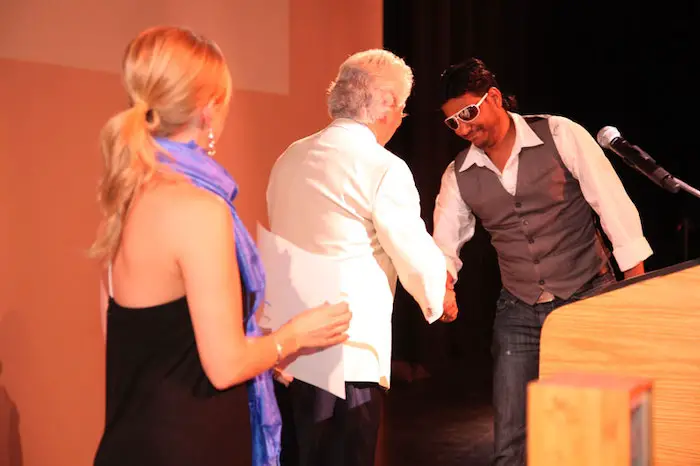
Lynn Shelton’s Touchy Feely has the lingering sensation of a film that could explode into so many directions. The writer/director’s two previous festival successes, Humpday and Your Sister’s Sister, subsequently dealt with sexual taboos of partners traditionally unattracted to one another. Repulsion would be a strong word to justify around those situations, but it becomes one of the prevailing themes of her latest work that expands her upon her more usual intimate ensembles. Instead the twosome and threesome of the past becomes six individuals, each dealing with an aversion to emotional and physical contact to such an extent that, by the end, it may be hard for the viewer to feel much of anything.
Abby (Rosemarie DeWitt) works as a massage therapist who lets out her own stress through her friend Bronwyn (Alison Janney), who fashions herself a healer and an herbalist. Abby’s brother, Paul (Josh Pais), is a dentist whose personal demeanor makes him a candidate for the watch list of a profession known for its suicidal tendencies. He can barely connect with his own daughter, Jenny (Ellen Page), who has trouble suppressing her clear crush on her aunt’s boyfriend (Scoot McNairy). Then, a funny thing happens.
Abby becomes sickened to the touch of skin. We have all been there on our own jobs, right? Garbage men and sewer rooters aside, everyone hits that wall eventually when the most innocuous of items becomes the one thing you could do without forever. Remember the mover on Seinfeld who didn’t have any furniture in his home? Abby takes it a step further though, reevaluating the life that led to this bizarre affliction. In some karmic balance, however, brother Paul begins receiving praise for miraculously curing the chronic TMJ pain of his patients. He is a dentist, after all, but without even trying his magic fingers are causing an influx of patients.
All of these characters are going to intersect in some way, with a sixth played by Ron Livingston, as a mysterious stalker adding more insight in what may be too little, too late. Credit Shelton for trying something a little more visual and poetic than the more comically-inclined relations of her past characters, but her comfort zone has been replaced with far more silences and wandering. It gets so passive that a viewer may feel like they are within that phase between relaxation and boredom that comes from the dulcet forest sounds permeating their massage appointment.
Not that the subject matter does not have the potential to penetrate into Shelton’s recurring themes of interpersonal connection, but the approach to it all ironically keeps us at a distance from really getting to know most of these characters. DeWitt gets to spend the bulk of the film working out a lot internally but her character is indicative of the script’s distant emotions. Pais may win over some as a sad, almost childlike innocent in a grown-up’s body, but the characterization is so one-note that even when his physiology changes the performance does not.
The film’s best, most noteworthy, work is left to Ellen Page, whose joy of being around the man she loves can barely push through the mask that is well ahead of the crush curve. Her rain-soaked doorway plea to be loved is the kind of moment Touchy Feely needed more of as the replacement for the ultra-feeling ecstasy in a bag that we are just waiting to cliché itself into the wrong body. One pill becoming the meaningless MacGuffin in a film that should be about avoiding such cheats is an affectation on a title that just never lives up to its potential.

